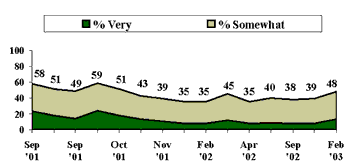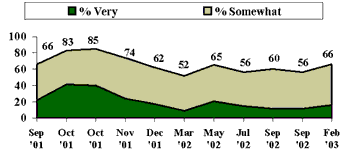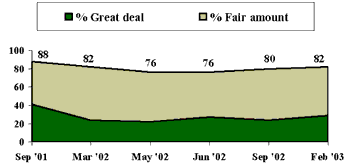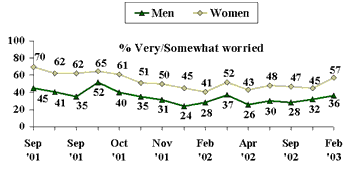GALLUP NEWS SERVICE
PRINCETON, NJ -- Last Friday, the U.S. government raised the level of a terrorist threat from "yellow" to "orange," the second highest level on the color-coded scale. A new CNN/USA Today/Gallup poll, conducted over the weekend, shows a growing fear of terrorism in the country, and an increased expectation that terrorist acts will occur in the United States over the next several weeks. The increased level of fear over the last few weeks is much more evident among women than men.
The poll was conducted Feb. 7-9, following Homeland Security Director Tom Ridge's announcement that the government was elevating the terror warning. Forty-eight percent of Americans now say they are either very (13%) or somewhat (35%) worried that they will become a victim of terrorism. This is up sharply from two weeks ago, when a Jan. 23-25 poll showed that 39% were worried (including 8% who were very worried). The current level of fear is the highest it has been since October 2001, about one month after attacks on the World Trade Center and Pentagon.
| Worry About Becoming a Victim of Terrorism |
 |
Now, two-thirds of Americans say further acts of terrorism are at least somewhat likely in the United States over the next several weeks, including 16% who say they are very likely to occur. These results are similar to those of last May (shortly after it was revealed the government had information prior to 9/11 about al Qaeda plans to hijack planes), when 65% thought future terror was likely. Not since November 2001 have more Americans expected terrorist acts to occur in the United States.
| Expectation of Future Terrorism in the U.S. |
 |
Nevertheless, the public remains confident in the government's ability to protect citizens from terrorism. Twenty-nine percent express a great deal of confidence, and another 53% say they have a fair amount of confidence. The combined total of 82% of Americans who have at least a fair amount of confidence has stayed roughly the same over the last year.
| Confidence in Government to Protect Citizens From Terrorism |
 |
Women More Likely to Fear Terrorism
As has been the case since the terrorist attacks occurred, women are much more likely than men to express fear of being a terrorist victim, by the considerable margin of 57% to 36%. Women (16%) are twice as likely as men (8%) to say they are very worried about being victimized. The gap exists even though women (66%) are as likely as men (67%) to say that future acts of terrorism are at least somewhat likely over the next several weeks, and women (81%) are about as likely as men (83%) to have confidence that the government can protect U.S. citizens from future terrorism.
Both men and women show increased levels of fear when the current results are compared with the results from the Jan. 23-25 poll. In that poll, 45% of women and 32% of men expressed fear. However, the increase has been much greater among women (from 45% to 57%, for a total of 12 percentage points) than among men (32% to 36%, an increase of 4 points).
The current fear gap of 21 points is slightly higher than the 19-point average of all measurements of the question since 9/11, and is the largest it has been since November 2001.
| Fear of Terrorism: By Gender |
 |
Survey Methods
These results are based on telephone interviews with a randomly selected national sample of 1,000 adults, 18 years and older, conducted Feb. 7-9, 2003. For results based on this sample, one can say with 95 percent confidence that the maximum error attributable to sampling and other random effects is plus or minus 3 percentage points. In addition to sampling error, question wording and practical difficulties in conducting surveys can introduce error or bias into the findings of public opinion polls.
How worried are you that you or someone in your family will become a victim of terrorism -- very worried, somewhat worried, not too worried, or not worried at all?
BASED ON –499—NATIONAL ADULTS IN FORM A
|
|
|
|
Not |
KNOW A VICTIM (vol.) |
|
||
|
% |
% |
% |
% |
% |
% |
||
|
2003 Feb 7-9 ^ |
13 |
35 |
34 |
18 |
* |
* |
|
|
2003 Jan 23-25 |
8 |
31 |
36 |
25 |
-- |
* |
|
|
2002 Sep 2-4 |
8 |
30 |
37 |
25 |
* |
* |
|
|
2002 May 28-29 |
9 |
31 |
37 |
22 |
1 |
* |
|
|
2002 Apr 22-24 |
8 |
27 |
39 |
25 |
1 |
* |
|
|
2002 Mar 4-7 |
12 |
33 |
32 |
23 |
* |
* |
|
|
2002 Feb 4-6 ^ |
8 |
27 |
39 |
25 |
0 |
1 |
|
|
2001 Nov 26-27 |
8 |
27 |
34 |
30 |
1 |
* |
|
|
2001 Nov 2-4 |
11 |
28 |
34 |
26 |
0 |
1 |
|
|
2001 Oct 19-21 † |
13 |
30 |
33 |
23 |
* |
1 |
|
|
2001 Oct 11-14 † |
18 |
33 |
35 |
14 |
* |
* |
|
|
2001 Oct 5-6 † |
24 |
35 |
27 |
14 |
* |
* |
|
|
2001 Sep 21-22 † |
14 |
35 |
32 |
18 |
* |
1 |
|
|
2001 Sep 14-15 † |
18 |
33 |
35 |
13 |
* |
1 |
|
|
2001 Sep 11 † ‡ |
23 |
35 |
24 |
16 |
1 |
1 |
|
|
2000 Apr 7-9 ^ |
4 |
20 |
41 |
34 |
-- |
1 |
|
|
1998 Aug 20 ‡ ? |
10 |
22 |
38 |
29 |
-- |
1 |
|
|
1996 Jul 20-21 ‡ |
13 |
26 |
34 |
27 |
-- |
* |
|
|
1996 Apr 9-10 ? |
13 |
22 |
33 |
32 |
-- |
* |
|
|
1995 Apr 21-23 ? |
14 |
28 |
33 |
24 |
-- |
1 |
|
|
^ |
Asked of a half sample. |
||||||
|
† |
WORDING: How worried are you that you or someone in your family will become a victim of a terrorist attack -- very worried, somewhat worried, not too worried, or not worried at all? |
||||||
|
‡ |
Based on one night poll of national adults with a margin of error of ±4 pct. pts. |
||||||
|
? |
WORDING: How worried are you that someone in your family will become a victim of a terrorist attack similar to the bombing in Oklahoma City? |
||||||
|
? |
WORDING: How worried are you that you or someone in your family will become a victim of a terrorist attack similar to the bombing in Oklahoma City? |
||||||
How likely is it that there will be further acts of terrorism in the United States over the next several weeks -- very likely, somewhat likely, not too likely, or not at all likely?
BASED ON –501—NATIONAL ADULTS IN FORM B
|
Very |
Somewhat likely |
Not too |
Not at all likely |
No |
||
|
% |
% |
% |
% |
% |
||
|
2003 Feb 7-9 ^ |
16 |
50 |
23 |
9 |
2 |
|
|
2002 Sep 13-16 ^ |
12 |
44 |
31 |
10 |
3 |
|
|
2002 Sep 2-4 |
12 |
48 |
28 |
9 |
3 |
|
|
2002 Jul 5-8 ^ |
15 |
41 |
30 |
12 |
2 |
|
|
2002 May 20-22 ^ |
21 |
44 |
25 |
7 |
3 |
|
|
2002 Mar 8-9 ^ |
9 |
43 |
32 |
13 |
3 |
|
|
2001 Dec 14-16 ^ |
17 |
45 |
27 |
8 |
3 |
|
|
2001 Nov 2-4 ^ |
24 |
50 |
16 |
6 |
4 |
|
|
2001 Oct 19-21 ^ |
40 |
45 |
10 |
3 |
2 |
|
|
2001 Oct 7 † ‡ |
41 |
42 |
9 |
4 |
4 |
|
|
2001 Sep 21-22 ‡ |
22 |
44 |
24 |
8 |
2 |
|
|
^ |
Asked of a half sample. |
|||||
|
† |
Polls conducted entirely in one day, such as this one, are subject to additional error or bias not found in polls conducted over several days. |
|||||
|
‡ |
WORDING: How likely is it that there will be further terrorist attacks in the United States over the next several weeks -- very likely, somewhat likely, not too likely, or not at all likely? |
|||||
How much confidence do you have in the U.S. government to protect its citizens from future terrorist attacks -- a great deal, a fair amount, not very much, or none at all?
|
Great |
Fair |
Not very much |
|
No |
|
|
% |
% |
% |
% |
% |
|
|
2003 Feb 7-9 |
29 |
53 |
14 |
4 |
* |
|
2002 Sep 2-4 |
24 |
56 |
16 |
3 |
1 |
|
2002 Jun 7-8 |
27 |
49 |
17 |
5 |
2 |
|
2002 May 20-22 |
22 |
54 |
18 |
5 |
1 |
|
2002 Mar 8-9 |
24 |
58 |
15 |
2 |
1 |
|
2001 Sep 14-15 |
41 |
47 |
9 |
2 |
1 |
* -- Less than 0.5%
